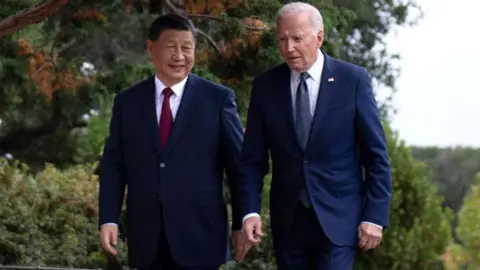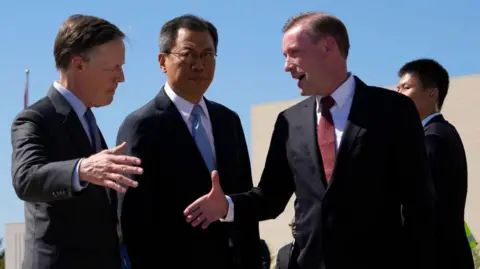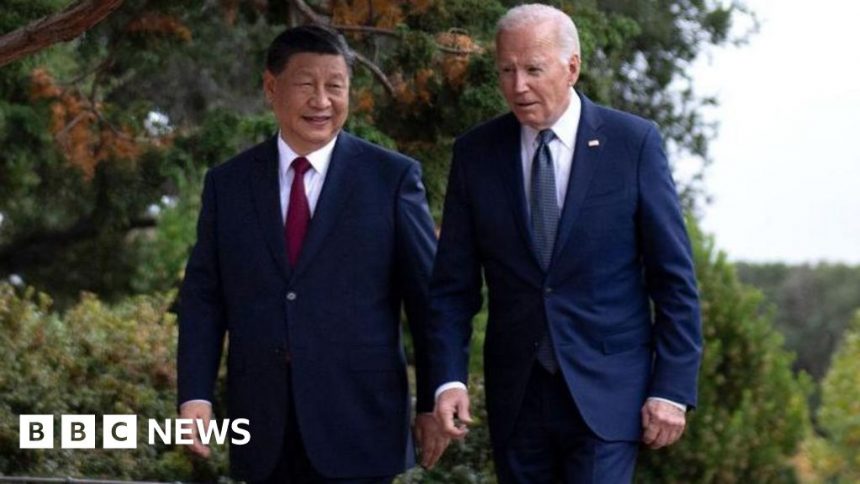Top-level meeting shows China – and Xi – still a priority for Biden
 Getty Images
Getty ImagesJake Sullivan has arrived on his first visit to China as US national security adviser. He will hold talks with Foreign Minister Wang Yi as the two countries try to stabilise relations.
Mr Sullivan and Mr Wang have met four times over 16 months in Vienna, Malta, Washington and Bangkok. Their last meeting in January was shortly after a high-stakes summit between Presidents Xi Jinping and Joe Biden that sought to reset frosty ties.
This week’s talks – scheduled for Tuesday and Wednesday – signal that China is still a priority for the Biden administration, even as the retiring president enters his final months in office.
Is another summit on the cards?
The White House is trying not to explicitly link Mr Sullivan’s trip to the US presidential election. But it’s hard to ignore the timing.
If Mr Sullivan is able to lay the groundwork for a final Biden-Xi summit, his trip would tie up the ends of the US president’s most consequential – and fraught – foreign policy relationship.
Beijing’s view: A “critical juncture”
US and Chinese diplomats always acknowledge that talks between Washington and Beijing are never easy. And there is a lot to talk about.
With the unexpected turn the US election has taken with Biden bowing out in favour of Kamala Harris, China is watching closely for what the next presidency might have in store.
Donald Trump has made it clear he will raise tariffs further on Chinese goods, potentially deepening the trade war he kicked off in 2019.
While Mr Biden’s administration saw merit in diplomacy, he didn’t reverse Trump-era tariffs and has added more – in May he announced steep duties on Chinese-made electric cars, solar panels, and steel.
Mr Biden has also strengthened alliances across Asia to combat China’s rising influence and beefed up Washington’s military presence – which, in turn, has rattled Beijing.
So far, the Harris campaign has not given many clues about how she plans to manage the relationship with China.
And the White House has made clear that Mr Sullivan’s visit is meant to continue the work of the Biden administration, rather than set the tone for the next president.
But China is likely looking ahead anyway.
 Getty Images
Getty ImagesBeijing will use this opportunity with Mr Sullivan to clarify its own priorities. It will hope that all parties in America are listening – China’s ministry of foreign affairs has described this as a “critical juncture” between the world’s two biggest economies.
For China, the red line is and always will be Taiwan. It claims the self-governing island and has repeatedly said it will not tolerate any signs that Washington is encouraging Taiwanese independence.
High-profile diplomatic visits, such as a controversial one by then House Speaker Nancy Pelosi in 2022, or recognition of Taiwan’s elections or its elected leaders, fall into that category.
Chinese state media has said Beijing will focus on expressing grave concerns, stating its position, and making serious demands on matters such as the “Taiwan question”.
China will also have some strong words for Mr Sullivan on trade. Beijing has described US tariffs on Chinese goods as “unreasonable” and has urged Washington to “stop politicising and securitising economic and trade issues” and “take more measures to facilitate people-to-people exchanges between the two countries”.
Washington’s view: Stealth over bravado
When he came to power, Mr Biden wanted to set ties with China on an even keel after what he saw as the chaos and unpredictability of the Trump White House.
His administration has wanted to “responsibly manage” rivalry with Beijing; to demonstrate American power and competition with China through stealth not bravado.
But that strategy has been upended amid the turbulence of events.
Last year, crisis engulfed the direct relationship when an American fighter jet shot down a suspected Chinese spy balloon over US territory.
The wars in Ukraine and the Middle East have further sharpened the tone.
US Secretary of State Antony Blinken visited Beijing in April with a warning – Washington would act if China did not stop supplying Russia with microchips and machine parts to build weapons used in its war in Ukraine.
He accused his Chinese counterparts of “helping to fuel the biggest threat” to European security since the Cold War.
His warning materialised with a raft of sanctions on Chinese firms over their alleged support of the Russian military.
This is a tricky subject that China keeps trying to bat away, but Washington is insistent, and Mr Sullivan is likely to bring it up again.
China’s increasing assertiveness in Asia has also made the US wary of the impact of those ties further afield – particularly with Iran, which allies itself with Moscow and also arms Israel’s adversaries.
Finally, in America, there is the devastating domestic impact of Chinese-manufactured “pre-cursor” chemicals to make synthetic opioids like fentanyl, overdoses of which are killing more Americans than ever and the crisis has laid waste to entire towns.
The goal: ‘Stable relations’
Last year’s summit between Mr Biden and Mr Xi in San Fransisco was meant to make progress on these issues.
Since then, despite the tariffs and the stern rhetoric, Washington and Beijing have acknowledged their differences – and reports of the two sides striking a deal on curbing fentanyl production are a good sign.
In April, when the BBC accompanied US Secretary of State Antony Blinken on his visit to Shanghai and Beijing, the public elements of some of his meetings with senior Chinese officials felt like a steely stand-off.
It was a show of diplomatic strength meant for each side’s domestic audience. And this will undoubtedly be a part of Mr Sullivan’s trip too, as he tries to bolster Mr Biden’s diplomacy in the waning months of his presidency.
But these meetings serve another fundamental purpose – face-to-face time between two rival, inter-dependent economies as they battle mutual distrust and try to probe each other’s real intentions.
It seems that Jake Sullivan’s previous meetings with Wang Yi have quietly laid the groundwork for what both sides call “stable relations”.
In a recent speech at the Council of Foreign Relations in Washington, Mr Sullivan said that he and Mr Wang had “increasingly gotten to the point of setting aside the talking points and really having strategic conversations”.
He described the character of those conversations as “direct”, including one on the war in Ukraine.
“Both of us left feeling that we didn’t agree or see eye-to-eye on everything but that there was a lot of work to carry forward.”








